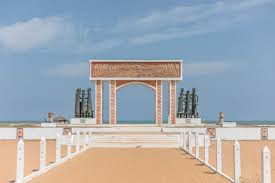
In Benin, the iconic “Historic City of Ouidah” monument, which had stood at the Vassého crossroads for nearly two decades, has been demolished to make way for a new urban redevelopment project.
Erected in 2006 by the Vivre à Ouidah association after six years of construction, the monument symbolised the city’s rich cultural and historical heritage.
The structure, featuring an arch supported by four pillars adorned with sculpted pythons, showcased key landmarks such as the Basilica of the Immaculate Conception, the Temple of the Pythons, the Sacred Forest of Kpassè, and the Gate of No Return.
These sites reflect the unique identity of Ouidah and its pivotal role in West African history. Today, the site has been reduced to a field of rubble, awaiting a larger commemorative structure.
Authorities say the demolition is part of a comprehensive memorial overhaul aimed at addressing the history of the slave trade with greater depth and accuracy.
“A more significant architectural work is expected to emerge on this site, designed to honour the memory of the people who were victims of slavery while enhancing the city’s tourism potential,” officials stated.
Since 2021, the National Agency for the Promotion of Heritage and Tourism Development (ANPT) has spearheaded a major initiative to reconstruct and redevelop Ouidah.
The project encompasses the restoration of historic forts, creation of a memorial trail, rehabilitation of historical circuits, and development of infrastructure for visitors, including leisure areas, promenades, informative signage, and a craft village.
The government of President Patrice Talon has framed the initiative as a strategy to position Ouidah as a continental hub for memorial tourism. By combining heritage preservation with modern tourism facilities, authorities aim to strengthen the city’s cultural appeal while ensuring that the memory of the transatlantic slave trade and its victims remains central to public consciousness.
With these ambitious redevelopment plans, Ouidah is set to reaffirm its status not only as a historic city but also as a destination where history, culture, and remembrance converge for both local communities and international visitors.



